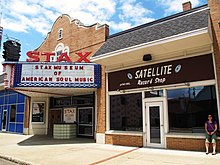Stax Museum of American Soul Music
 | |
 | |
| Established | May 2003 |
|---|---|
| Location | 926 East McLemore Avenue Memphis, Tennessee United States |
| Coordinates | 35°06′58″N 90°01′53″W / 35.115976°N 90.031456°WCoordinates: 35°06′58″N 90°01′53″W / 35.115976°N 90.031456°W |
| Type | Soul music museum |
| Executive director | Jeff Kollath |
| Director | Kimberly Hooper-Taylor (Education), Raka Nandi (Collections) |
| Website | www |
The Stax Museum of American Soul Music is a museum located in Memphis, Tennessee, at 926 East McLemore Avenue, the former location of Stax Records. It is operated by the Soulsville Foundation, which also operates the adjacent Stax Music Academy[1] and The Soulsville Charter School, all located on one campus.
History[]
After Stax Records was forced into involuntary bankruptcy and closed in 1976, the Stax studio was sold by the Union Planters Bank to Southside Church of God in Christ, located nearby on McLemore Avenue. Except for a brief time when it was used as a soup kitchen, it was allowed to deteriorate so it was torn down in 1989. The neighborhood had deteriorated badly and by 1998, a group of concerned people and anonymous philanthropists spearheaded a nonprofit revitalization effort for the area which was dubbed Soulsville after the slogan "Soulsville U.S.A." which Stax called its studio on its former theater marquee as a counterpoint to Motown Records' Hitsville U.S.A.
Construction began on the Stax Museum and adjacent Stax Music Academy in April 2001. The Stax Music Academy, which had started programming at a nearby elementary school in 2000, opened in 2002 and the museum opened in May 2003. The Stax Museum is a replica of the Stax recording studio, the former Capitol Theatre, down to the sloping floor of studio A. It is a 17,000-square-foot (1,600 m2) museum with videos, films, photographs, original instruments used to record Stax hits, stage costumes, interactive exhibits, and more than 2000 other items of memorabilia. Some of the standout exhibits include an authentic circa-1906-old Mississippi Delta church from Mississippi, reconstructed in the museum to help show the gospel roots of soul music; the Soul Train dance floor, Isaac Hayes' restored 1972 gold-trimmed, peacock-blue Cadillac El Dorado; and a changing gallery where special exhibits change five times each year.

Because the Stax Museum is one of only a handful of museums in the world dedicated to soul music (the Motown Museum in Detroit is another), it not only celebrates the legacy of Stax Records and its artists such as Isaac Hayes, Otis Redding, Sam & Dave, the Staple Singers, Johnnie Taylor, Albert King, Booker T. & the MGs, Rufus and Carla Thomas and others, but also features other soul music labels such as Motown, Hi Records, Atlantic Records, and Muscle Shoals, and visitors are treated to vintage video footage of non-Stax artists such as Aretha Franklin, Al Green, Stevie Wonder, Marvin Gaye, Ann Peebles, The Jackson Five, Patti LaBelle, Parliament-Funkadelic, Sam Cooke, James Brown, Ike & Tina Turner, and others.
The Stax Music Academy is a facility where primarily at-risk youth are mentored through music education and unique performance opportunities they would otherwise likely never experience. In 2019, Justin Timberlake and the Levi's Music Project visited the academy for several days and installed a permanent songwriting lab, which has led to the students creating more original music and studying music business. The Soulsville Foundation also operates The Soulsville Charter School, an academically rigorous, musically rich college prep school where students study math, language arts, science, social studies, along with strings orchestra, band, and choir. Their Soulsville Symphony Orchestra has played for the likes of Stevie Wonder, John Legend, and Isaac Hayes.[2]
See also[]
References[]
| Wikimedia Commons has media related to Stax Museum. |
- ^ Jones, Steve (17 December 2006). "Relaunch showcases the soul of Stax Records". USA Today.
- ^ Maynard, Micheline (17 March 2009). "Tributes to Motown and Southern Soul". The New York Times. p. F22.
External links[]
- Music museums in Tennessee
- Museums in Memphis, Tennessee







